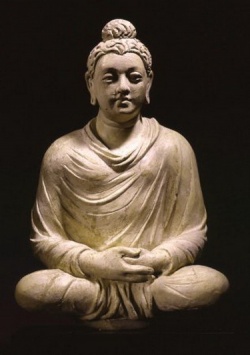Difference between revisions of "Rupakaya"
Jump to navigation
Jump to search
| Line 7: | Line 7: | ||
{{R}} | {{R}} | ||
[http://www.rigpawiki.org/index.php?title=Rupakaya www.rigpawiki.org] | [http://www.rigpawiki.org/index.php?title=Rupakaya www.rigpawiki.org] | ||
| + | |||
| + | |||
| + | Eng: form body) | ||
| + | |||
| + | The [[form body]] of a [[fully enlightened being]]; the result of the complete and perfect accumulation of [[merit]]. | ||
| + | |||
| + | It has two aspects - [[sambhogakaya]], ([[enjoyment body]]), in which the [[enlightened]] [[mind]] appears to benefit highly realized [[bodhisattvas]], | ||
| + | and [[nirmanakaya]], ([[emanation body]]), in which the [[enlightened]] [[mind]] appears to benefit ordinary beings. | ||
| + | |||
| + | See also [[dharmakaya]], [[nirmanakaya]], [[sambhogakaya]], [[three kayas]] and [[four kayas]]. | ||
| + | |||
| + | |||
[[Category:Trikaya]] | [[Category:Trikaya]] | ||
[[Category:Rupa]] | [[Category:Rupa]] | ||
[[Category:Kaya's]] | [[Category:Kaya's]] | ||
Revision as of 16:27, 30 August 2018
Rupakaya (Skt. rūpakāya; Tib. གཟུགས་སྐུ་, zukku; Wyl. gzugs sku) refers to the two 'form kayas' of a buddha: nirmanakaya and sambhogakaya.
It is said that the rupakaya arises from the accumulation of merit and the dharmakaya from the accumulation of wisdom.
Source
Eng: form body)
The form body of a fully enlightened being; the result of the complete and perfect accumulation of merit.
It has two aspects - sambhogakaya, (enjoyment body), in which the enlightened mind appears to benefit highly realized bodhisattvas, and nirmanakaya, (emanation body), in which the enlightened mind appears to benefit ordinary beings.
See also dharmakaya, nirmanakaya, sambhogakaya, three kayas and four kayas.
